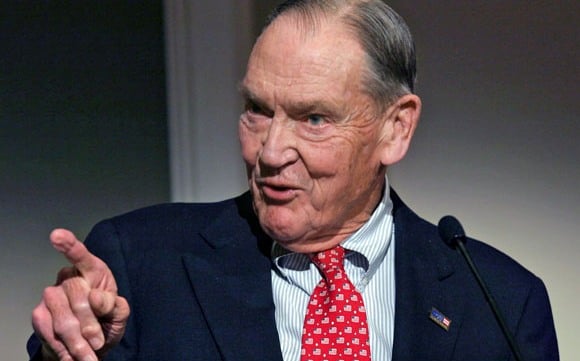So-called father of indexing John Bogle still not a fan of exchange-traded funds, saying that the sheer volume of them makes 'a muddy pool muddier.'
John Bogle, founder of The Vanguard Group Inc., believes low-cost, passive indexes are the best way to invest — as long as they're not offered through an exchange-traded fund.
“There's no question that ETFs are the greatest trading innovation of the 21st century,” Mr. Bogle said today at the Bloomberg Portfolio Manager Mash-Up in New York. “But the question is, ‘Are they the greatest investment innovation?' and the answer is ‘no.'”
Mr. Bogle recalled seeing an ad for the SPDR S&P 500 ETF that touted the ability to trade the S&P 500 throughout the day and thinking, “Who the hell wants to do that?”
The ability to trade the funds intraday leads to bad decisions by investors, such as buying high and selling low, which cause them to underperform over the long run.
Mr. Bogle even has qualms with the ETF providers for the influx of products, which he says makes it even more difficult for investors to pick the right fund. “There's something like 2,000 ETFs now,” Mr. Bogle said. “That's almost as many stocks as there are
Mr. Bogle called out BlackRock Inc. for its aggressive product launches. “BlackRock is just making a muddy pool muddier,” he said.
BlackRock's ETF arm iShares offers more than 260 ETFs, seven of which were launched today. That's nearly 100 more than the next biggest ETF lineup. Vanguard currently offers 47 ETFs.
A request for comment from BlackRock made at 2:45 p.m.on Thursday was not returned.
Mr. Bogle does have one thing in common with BlackRock though — a bullish outlook on stocks over the next decade.
He didn't go as far as BlackRock's chief executive Larry Fink did recently and claim that investors should be 100% in equities. He did say, however, that the case for stocks to outperform bonds over the next 10 years was “pretty simple.”
Bond yields have a 90% correlation to 10-year returns, Mr. Bogle said. With bond yields at historic lows, that should translate to returns of no more than 3% or 4% over the next 10 years, he said.
Stocks, meanwhile, should benefit from a strengthening U.S. economy and have returns closer to 7%, he said. “But not without a few bumps along the way.”
Bogle, mashed up







